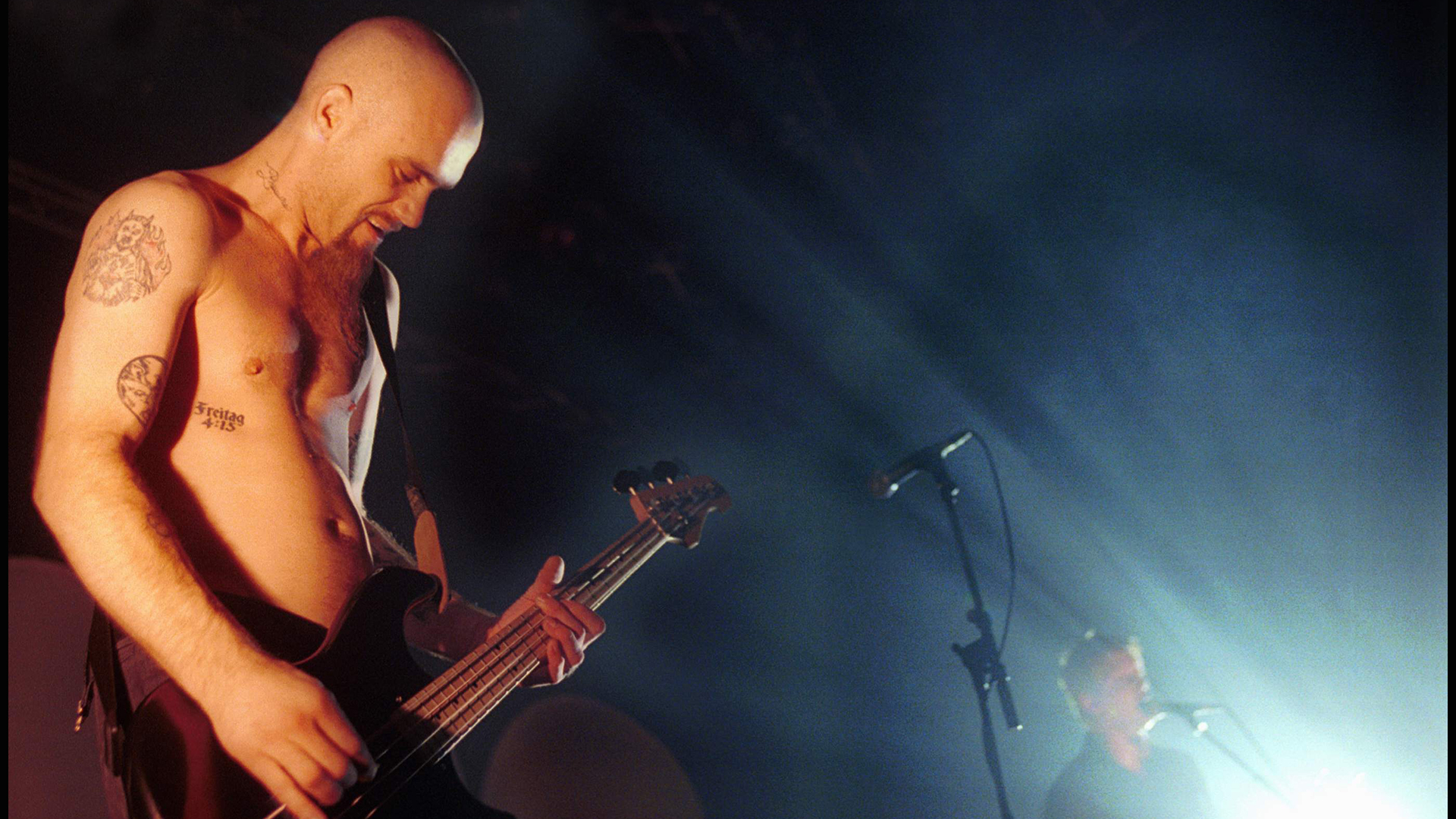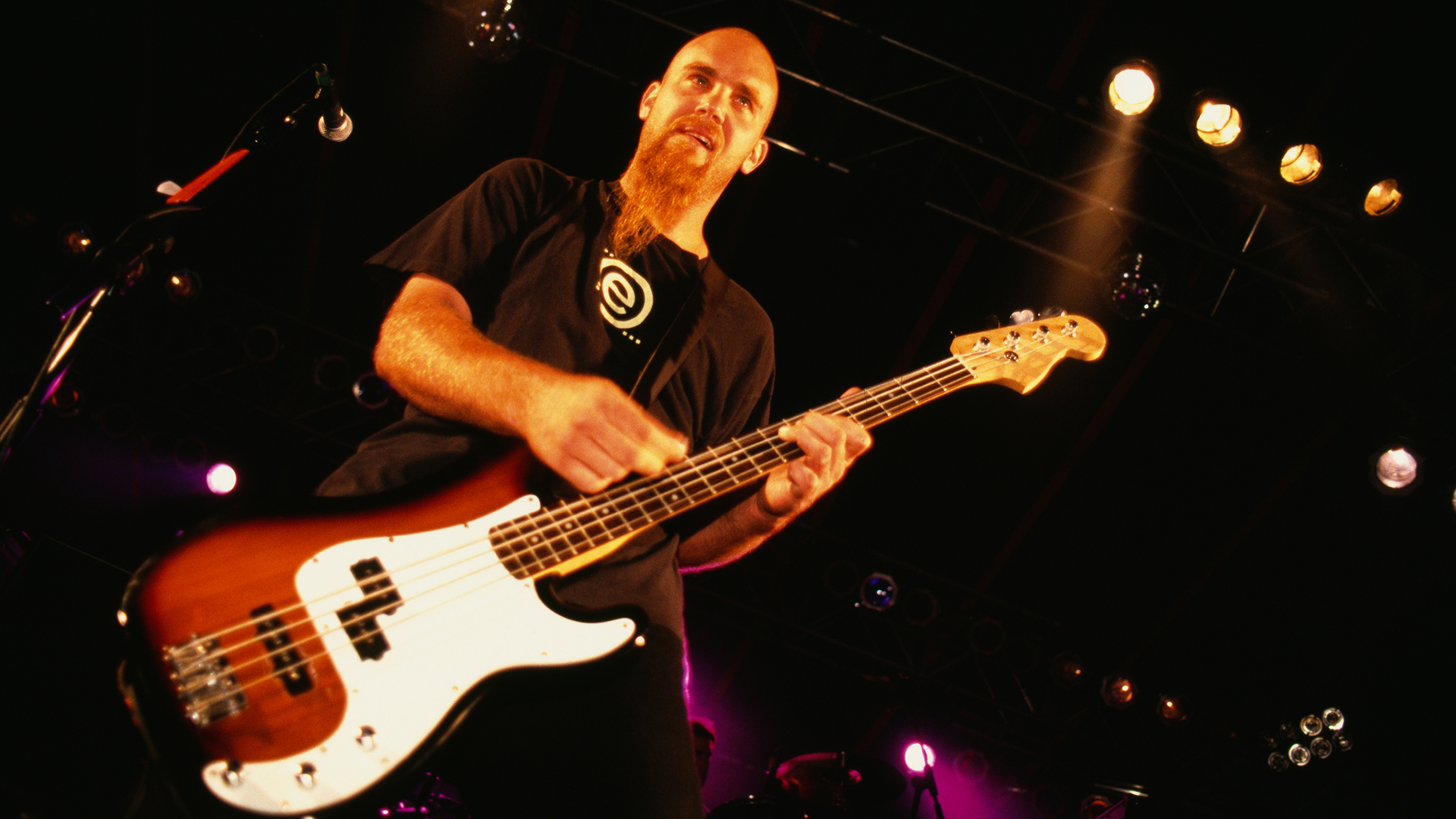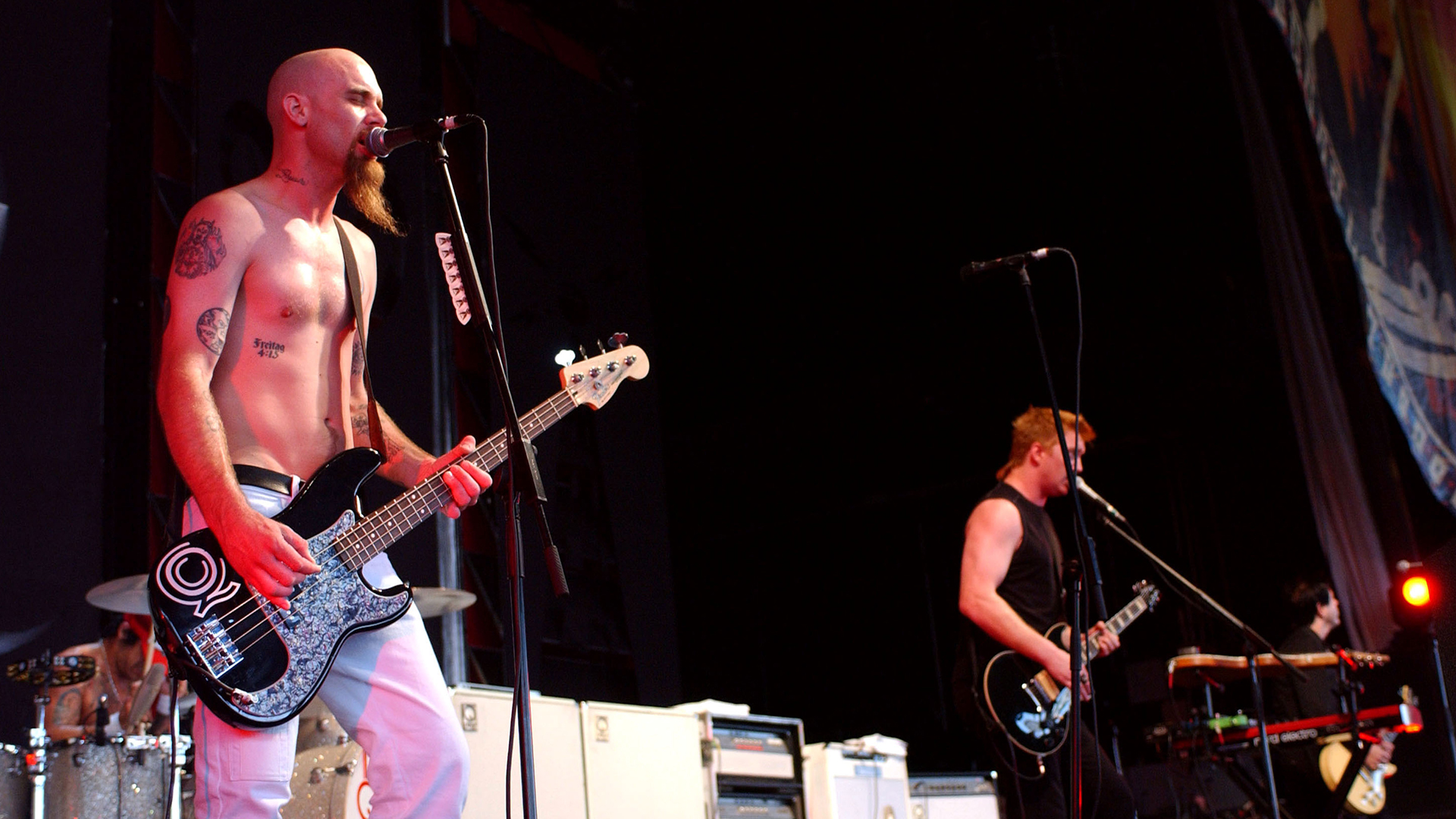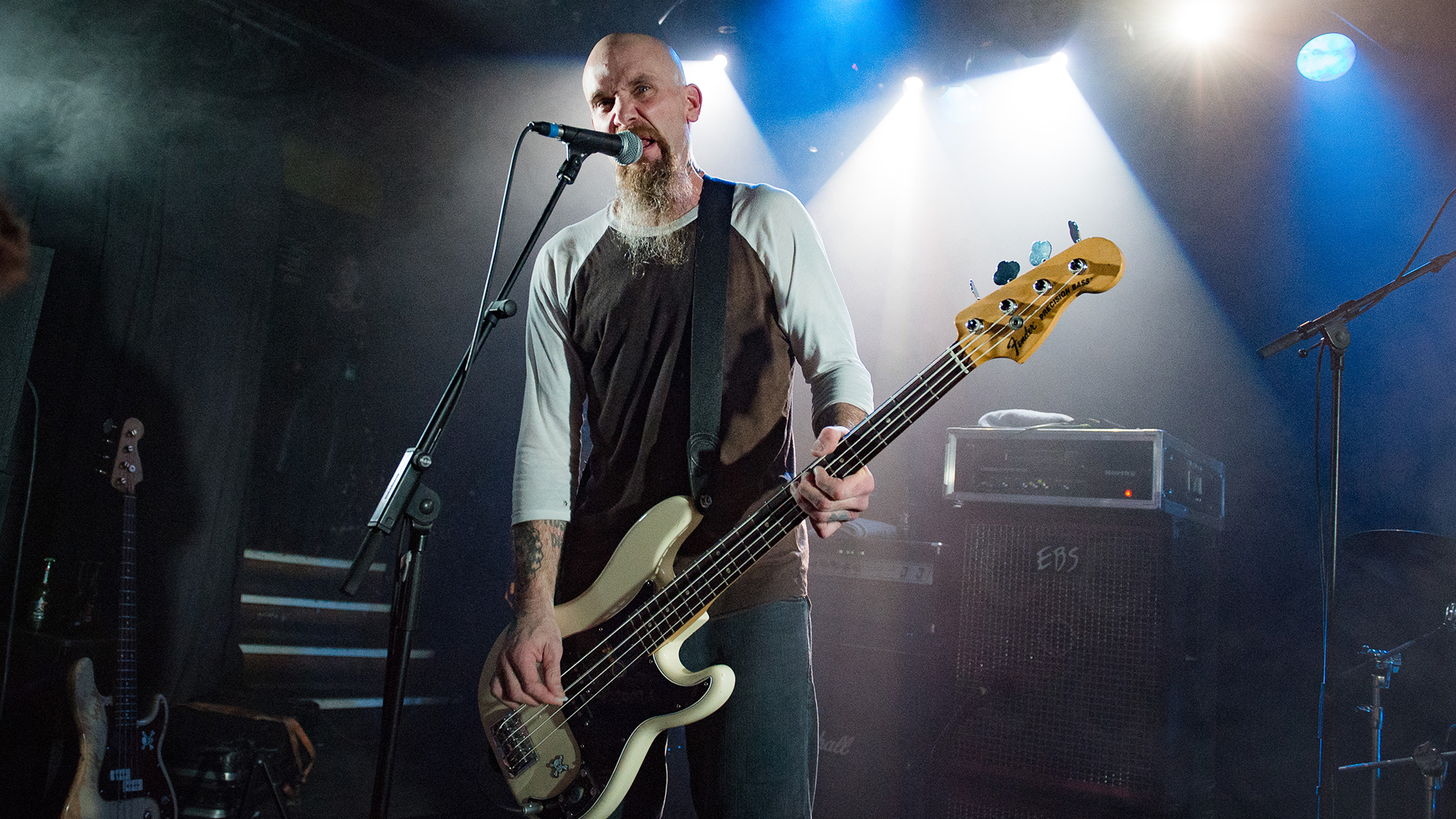
At 52, with a heavy bass slung over his shoulder, a half-burned cigarette dangling from his lips, and a maniacal grin accented by a raggedy goatee, Nick Oliveri is a throwback to a bygone era. He’s never been afraid to speak his mind, but he’s earned that through years of throat-stomping music.
Despite his explosive reputation, Oliveri speaks with a weary tone, and one can’t help but get the idea that he’s seen too much. “Unfortunately,” he says of the members of the halcyon Palm Desert rock scene, “we all got old. But we’re still playing; we’re still at it.”
According to Oliveri, the fact that he’s still at it is probably only because he, like many of his old pals, “weren’t afraid to leave the desert.” Adding, “That’s why we did so well; we weren’t really accepted in the early days, so we weren’t afraid. That didn’t change until later, to be honest.”
The post-desert success Oliveri alludes to came after Kyuss, an iconic cult act he co-founded in 1987 while he was perched beside fellow hellraiser Josh Homme, who asked him to join Queens of the Stone Age. Oliveri’s impact was immediate, as Rated R (2000) and Song for the Deaf (2002) clocked in as iconic.
We weren’t really accepted in the early days, so we weren’t afraid. That didn’t change until later, to be honest
But an epic fall-out ensued, leading to Oliveri’s departure in 2004 and the end of what he calls the band’s “definitive lineup.” A lot has been said regarding his departure, but Oliveri claims there’s no bad blood. “There’s been bad times, good times, and great times,” he says.
“We accomplished more, I think, than we ever accomplished outside of knowing each other within other bands. So, I don’t know… I’ve got nothing bad to say about the dude. We’ve had our moments; it’s all water under the bridge, and everything’s good.”
For better or worse, Oliveri will forever be tied to Josh Homme. But that hasn’t stopped him from creating music outside of that sphere over the last twenty years. “I write about things going on,” he says. “I don’t always like the things going on around me, but I just try to have fun and stay happy.”
Despite the message of hope, when Oliveri speaks of the future, there’s heaviness in his voice and a tinge of sadness behind his eyes. “That’s all we can do these days. I’ve thought a lot about death lately. A lot of good people have died, and so have friends of mine. A lot of good people; it’s sad.”
“What are you gonna do? We are getting older, but I still make music. I still love it. I’m still at it. I still want to keep going.”
You were a key member of the early desert rock scene, though it was really a ‘scene’ back then, was it?
“I don’t remember a whole lot of it. [Laughs] We partied quite a bit, but it was fun and great. From what I remember, it was a really good time. But there really wasn’t a scene per se… it was, for us, all in a small town. But it wasn’t like a thing that people came from out of town to come see years and years later. And now, it’s pretty much gone.”
What do you remember about the early hours of Kyuss?
“I remember in 1987, I was just a little kid. Those guys were even younger. Chris Cockrell was the original bass player. I played rhythm guitar, and we played our first party at a house on Primrose Avenue near Palm Desert Middle School. It was a house party; we got our set together like we were gonna dazzle some people or whatever.”
So, you were confident.
“We were gonna rock out and have some fun. We were actually kind of nervous and scared that people weren’t gonna like us. But people did like us, and I remember John [Garcia] was scared to come in and sing because he was kind of shy. He sat in the car reviewing lyrics while we played this long instrumental, and he came in. I remember they liked what we were doing so much that they made us play twice. [Laughs]”

Kyuss played our first show at a house party. I remember John [Garcia] was scared to come in and sing. He sat in the car reviewing lyrics while we played this long instrumental
By 1991, you had your legs under you and recorded Wretch. And in 1992, you recorded Blues for the Red Sun, but you left soon after.
“I think it’s important that we broke up and that I left after Blues for the Red Sun and have Scott Reeder come in and play bass for Welcome to Sky Valley and for …And The Circus Leaves Town. Had the band stayed together, I don’t know what it would have been… who knows?”
Do you ever think about what might have been?
“Well, Kyuss wasn’t big until the fans made it big by trading the MP3s and shit like that, you know. They were trading cassettes and CDs; it’s funny because not a whole lot of people liked the band back then, so I didn’t regret it then. We had no way of knowing. The fans took it further than the band ever took it. And so, who knows what it would have been… maybe it would have crumbled, maybe it would have gotten big. I don’t think people were ready for it back then.”
You were only in Kyuss with Josh Homme for a short time, but he called you to join Queens of the Stone Age in 1998. You must have gotten on well.
“Yeah, well, when Queens started, Josh called me up and said, ‘Hey Dude, I was you to play bass.’ And I was living in Austin, Texas, and I said, ‘Well, send me a cassette; I want to hear it.’ He sent me a cassette, and it was like Mexicola, and things like that. It sparked my interest, so I told him, ‘I’ll come down and do it.’ I liked it.”
Your era of Queens produced some of the band’s best-loved music. Can you explain why that is?
“It was cool. We just kind of started like that, like old friends talking on the phone about music, and it just started that way. I said, ‘Sure, man, I’ll come on down. We’ll try it out and see what happens.’ We went for it, and it was immediately good, felt comfortable, and we all had that same hunger for belief in what we were doing. That mindset is why I think we did something good… we definitely were into it.”
Did you ever stop being into it?
“I mean… I’m still into it. It’s a good band and there’s good songs. We brought it, you know? We really cared about it, cared for it, loved it, and had pride in it. I think that’s a starting point for any band to succeed. Whether it be within themselves, national, or international success, you’ve got to give a shit about it. We really did, and I still love it. So, what the hell, you know?”
Paint a picture of what it was like to record albums like Rated R and Songs for the Deaf.
“Man, we had so much fun recording those records. We were crazy, and we were young. We’d do mushrooms, and then the next day, we’d be drinking or whatever. We’d be doing different things, being creative, wild, and crazy, and just having fun. We were young, wild, and crazy, and that led to some great moments on those records.”

Is there anything that sticks out most musically?
“What I remember most is a lot of good times and just listening back to them. And when I do listen to them, it reminds me of some great moments, like leaving the studio at seven in the morning after being there all night. And instead of going home, we’d go to this hotel down the street from Sound City in LA, and we’d go have more beer, smoke, and sit there and listen to what we had from a CD, just taking in what we’d accomplished that day. We’d make notes and just keep going until it was done. I’m still living that way, dammit. [Laughs]”
There has been plenty of speculation about your departure from Queens of the Stone Age. What is the truth of the matter?
“A lot of different things happened. We did a lot of things in a short period of time, you know, in a five-year period. We did a lot of records, a lot of non-stop touring, and a lot of side projects, which is crazy. We kind of burnt out on each other, I guess… I guess you could say that.”
Are you and Josh still friends?
“We still pick up where we left off whenever we see each other. We still talk on the phone. We’re still good friends. Josh is a good dude, and we get along well. I wish him all the success in the world; I just wish he’d take Mondo Generator on tour with them. [Laughs]”
We peaked out. You had Dave Grohl on drums, Mark Lanegan on vocals, I'm on bass and Josh is on guitar and vocals. It's kind of hard to do better, you know?
So, things weren’t as volatile between you and Josh as they were made out to be?
“Well, we’ve had our ups and downs. We’re like brothers, you know? We, like I said, got burned out on each other. We spent too much time together. So, being creative, you know, we spent a lot of time together, and we bounced off each other great. We made a lot of good music and had a lot of good times and laughter. I’d write apart, he’d write apart, and I’d come up with something for it, and we’d start laughing because it’s rad, you know? But there’s been bad moments as well. And there’s been great moments, you know, on tour, swapping girls, being crazy, and having fun.”
There’s a case to be made that Queens has never been the same without you. If given the chance, would you rejoin?
“I would do it, but it’s not my decision anymore. It’s Josh’s, and, well, I don’t really see him giving up what he’s got for bringing a partner in for his thing. He’s already gotten moving well on his own now. I would do it, but that’s… that’s on him.”
Do you agree that your era of Queens is the definitive era?
“I think we kind of peaked out. I mean… there’s a thing with the band, you know, you had Dave Grohl on drums, Mark Lanegan on vocals, I’m on bass and vocals, and Josh is on guitar and vocals. I think when you have a band like that going, it’s kind of hard to do better, you know? You can’t, really… there’s no way you can continue something like that with different members. I don’t see it as possible. I think that’s the main choice for most people as their definitive lineup because it’s the best lineup there was. It’s the best band I ever played in. I’ve yet to play in a band of such greatness and be surrounded by such greatness.”

Where would you be now if you hadn’t had that experience?
“Having to really up my game to be there with them got me better on my instrument real fast. So yeah, that’s definitely the definitive lineup for me. Great band, and the best band I ever played in.”
There’s gonna be no more rock stars; we’re like the last of a dying breed of rockers. It’s been a hard road…. But I’m still here. I’m still at it
Has your bass rig changed much since your Kyuss and Queens days?
“I play through all different kinds of stuff. I collect amps like a carpenter collects tools. [Laughs] I don’t know… I like pedals, and I play through Acoustic amps, Orange cabinets, Ampegs – all that stuff is tried and true. It sounds good, turns up, and can take punishment.”
Is there a particular bass that’s served you well?
“I’ve got a Fender Precision bass. It fits my style, so I play that; they feel right to me. I use Quarter Pounder pickups by Seymour Duncan because they have great output and give me a great tone. And I always use Ernie Ball strings and shit like that. I don’t know… I use whatever strings they give me. It’s pretty fun, and just hours of good times, making some noise, going through different pedals, like envelope filters, delays, fuzz and distortion pedals, and shit. I love all of it, like any other guitar freak, but I play bass. [Laughs]”
Since leaving Queens, you’ve kept at it with varying levels of success. What’s the key to staying afloat as a career musician after leaving a big band as you have?
“It’s stressful. Shit, I don’t know what would make it better. Well, a lot of things will make it better, but I don’t know what’s actually realistic. It seems to be all on the internet now, and everybody’s the same. There’s gonna be no more rock stars; we’re like the last of a dying breed of rockers that come from when there was still a record business out there. It’s a different game we’re playing and very tough.”
Do you ever regret getting into the music business?
“I don’t know… I’m just trying to stay afloat, man. It’s been a hard road with the change that’s happened in the past 20 years. But I’m still here. I’m still at it. I do it for myself, my friends, and my bandmates and because I don’t know what else to do. I don’t want to do anything else.”
- For more information on Nick Oliveri’s tour dates and releases head to Mondo Generator







